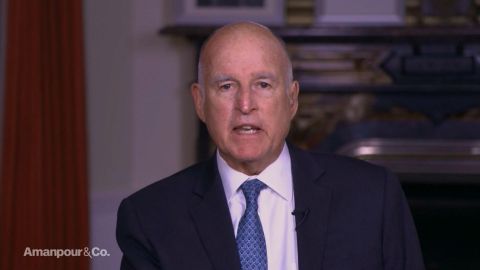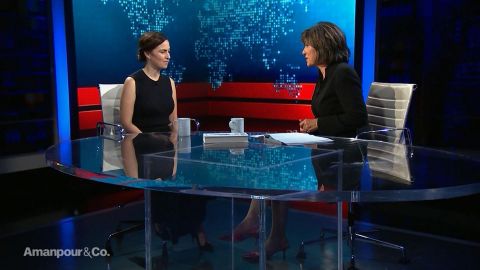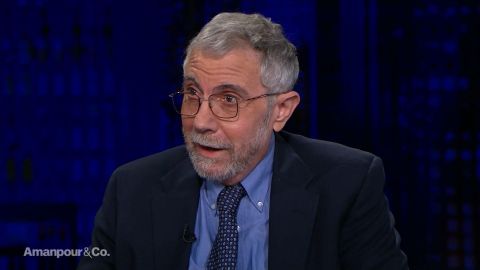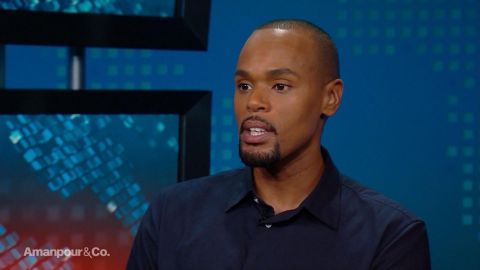Read Transcript EXPAND
ALICIA MENENDEZ: You know, Christiane, the title of the book says it all, it is “I Can’t Date Jesus: Love, Sex, Family,
Race And Other Reasons I’ve Put My Faith In Beyonce.” I asked Michael about what inspired the title.
MENENDEZ: Michael, thank you so much for joining me.
MICHAEL ARCENEAUX: Thank you so much for having me.
MENENDEZ: I think it would be easy to read the title of this book and assume that you are deeply irreverent about religion …
ARCENEAUX: Right.
MENENDEZ: … when in reality, you have great respect for faith.
ARCENEAUX: I do. A lot of the book is about forging your identity through an expression with sexuality to like live a complete full life and if you
grow up particularly in a church like the Catholic Church, you might grow up with a lot of resentment. And if you’re a queer person who has been
(inaudible) to feel isolated, you carry with you a lot of contempt and a lot of it is justified.
But I think for me just knowing how much religion has helped my mom — I love my mom dearly, but this is important for me and she was the
inspiration actually of the title “I Can’t Date Jesus.”
We were having a conversation and she knows that you’re born gay but I shouldn’t act on it because I might get hit by a bus and go to hell.
Because apparently it’s such a grave sin. And it’s just why I go, I can’t date Jesus, what do you want me to do?
I didn’t want to be angry at religion. I think I let go of the anger about my dad. I to let go of this anger I had with my mom and I wanted to let go
of my anger towards religion, too because I just felt like if I carried all of that anger with me, if I didn’t tame my inner Chris Brown, it would kind
of like devour me and I said, it’s only like, you’re either going to follow down that path or you’re going to forge your own and figure it out and I
chose to figure it out.
MENENDEZ: You are a devout Catholic.
ARCENEAUX: I was a devout Catholic myself, yes because I was raised, I was indoctrinated well, and I say that with all the respect in the world. I
think religion is very important. I think it has a lot of value. It doesn’t really fit in my life anymore, but at the time, yes, I was very
much ingrained in the Church like to the point as I write that I got approached for the priesthood at 20, a little lightweight recruiting.
MENENDEZ: So you have a pivotal life experience at the age of six with an uncle who dies of AIDS and in many ways your family’s reaction to that
gives you a window into how they feel about difference.
ARCENEAUX: Right. So it’s 1990, it was around the same time I was at a daycare center and, you know, people play doctor. I played, but I played
more so with little boys during that time, so I didn’t necessarily have the language, but I knew I was more attracted to boys than girls because I
tried it with girls and it just wasn’t as fun for me.
And while I was understanding that my uncle died of AIDS and as I write in the book, how I went to the funeral and in the aftermath, my father had
visceral reaction, is how I described it, and my mom didn’t necessarily confirm his sexuality because my dad had more than enough, but she put it
into context because he did die of a drug addiction but he was also gay.
But this is like 1990, so the reactions to AIDS were a testament to the tones. But when you’re six years old, you like boys, and you hear a slur
that speaks to people like that, that’s all I remember and that immediately became a point of reference.
MENENDEZ: Did you hope that you would change?
ARCENEAUX: Yes. I literally used to pray it away. I mean, thankfully I didn’t have any — my parents didn’t pick up on it that much. I mean, they
picked up on it, I believe, but they didn’t want to send me to some kind of camp.
When you grow up thinking you can either die or go to hell, and around this time this is also when you’re only going to see Pedro Zamora — he died of
AIDS, I think that was like Philadelphia, he died of AIDS. I see “In Living Color” the sketch with men on film, men who are overly effeminate
and they are just mocked. Those are my only point of reference to what it means to be gay, so it’s like you die, you go to hell, and you’re shamed.
MENENDEZ: And when you start living your life as a gay man, you come out to some of your friends but it’s five years before — between when you
start coming out and when you finally tell your mom.
ARCENEAUX: Yes.
MENENDEZ: How did you break it down for her?
ARCENEAUX: I think being gay was a struggle for me. But the chaos in my home kind of took precedent over that. So there was just a lot of mixed
emotions and anger …
MENENDEZ: Chaos because your dad was a drinker.
ARCENEAUX: My dad was a drinker. My parents would get into arguments. My dad could become very volatile. I love my father dearly, but at the time,
I was afraid of him. And so, beyond being gay, to be honest, even if I had a girlfriend, it would have taken me a lot to — and let my parents inside
of that because I think they were my point of reference to where I never wanted to get married or be with anyone.
I saw companionship kind of more as a detriment to someone than anything. But when I was 21, I came out to my friends because my friends had become
like my chosen family. I came up to my brother and sister later. It was very important that I came out to my sister because she’s nine years old
and I’m obsessed with my sister, and finally, at 25, I came out because around the time, there were two young black boys who were reported to have
committed suicide because they were being bullied in school for being perceived to be gay or gay.
And so I wrote about my experiences and this is pre-Twitter, so the word “viral” wasn’t really used, but the article was everywhere for it that day
and with the subsequent day which is still a big thing for like the internet. So, at the time, I didn’t really want to write about my life. I
wanted to keep that part to myself and just criticized other people.
And so I felt like it was at that point, I was like, this is bigger than me and even at the time when I was only 25, but I had a platform, like even a
teensy one, like if I could use it for the greater good, then I might as well use it. And so then, I had to tell my mom. I love my mom. She
didn’t have the kindest reaction.
ARCENEAUX: It’s hard because I’m so protective of my mother. She’s the most amazing person. I don’t know anyone stronger. But at the same time,
her religion has kept her alive. Her interpretation of religion, particularly Catholicism just in general, makes me not want to live, at
least that’s how I was raised in the Church and the Church’s overall teachings about my kind. I don’t find it to be like safe space for me.
MENENDEZ: So what I’m hearing is with your parents, you’re living in a space that is neither acceptance nor rejection, and I wonder what it is
like to live in that space with the people you love most.
ARCENEAUX: And that’s the thing, so often I think the narratives about people coming out, it’s usually extreme. You’re either welcomed with open
arms and your mom is twerking with you at the Pride Parade or she sends you to, I don’t know, a camp or she just doesn’t talk to you at all.
So what about that weird middle that I didn’t realize a lot more people lived in than I thought because lots of people have reached out to me to
say they understand. The way I write about my parents is that I wanted to make peace with just how we grew up and then make peace with why they feel
the way that they feel about my sexuality and actually, thanks to my sister, I got an education about my father.
My dad is actually less bothered about it than my mom is, I think. Sometimes you have to create your own closure. I would love to have that
conversation with my mom. I don’t think it’s ever going to happen. I would love to have that conversation with my dad — why I break it down,
this how it made us feel when we were in this house, but you have to meet people where they are and I don’t think — I don’t mean to be insulting —
I don’t think my — they don’t have the language to have the kind of conversation I wanted to have. I don’t think they are willing to have it.
I have taken qualities of my parents that I really like. Again, my mother’s strength, her humor, her candor. My dad just like had this great
energy and he knows how to charm people. I’ve taken things and he’s such a hard worker. I take things from my parents I can apply to my life. But
the things that I didn’t want to repeat, I’m good. I think I’ve changed.
MENENDEZ: Do you feel that you’ve created that closure for yourself?
ARCENEAUX: I think I have created as much closure as I can in this situation. I think if in a few years I get a call and be like, “I finally
read it, this is how I feel.” That would be great. I actually don’t think that’s going to happen. I think what can happen is that, I can — as I
write in the book, I can call my dad, just to see how you’re doing and then to call with “I love you.” And he says it back. But that’s already better
than the relationship with his dad.
I can talk to my mom, maybe not about everything, which still bothers me to some extent, but it kind of is what it is. She loves me as best she knows
how to, and in her heart of hearts, she thinks she is protecting me. And frankly, that’s probably as good as it is going to get. Once I get a man
or something, we’ll cross that bridge when we get to it. But I think that’s a lot better than a lot of people I know because they don’t even get
that.
MENENDEZ: Your book, it’s sharp, it’s funny, it’s probing, the writing is excellent. But the real miracle is that you got it published.
ARCENEAUX: Yes. Yes, it is.
MENENDEZ: What was the feedback you were getting when you were going around trying to sell this?
ARCENEAUX: There was this idea that you’re black and you’re gay so you’re ultra niche. And I also think typically when people consume otherness
especially if you’re a black person, it is largely in terms of pathology as in it’s so awful to be you. And so my book is like a mix of human pathos.
I don’t pretend to come from the nicest background, but I don’t write about it in this way that I’m trying to invite pity. Again, that’s typically how
— particularly my kind is concerned.
Men My kind being?
ARCENEAUX: Gay, black, country, all of that, again, I am not really supposed to be in these faces, because one person told me flatly in so many
words — well, no, it was flatly — he said, white people didn’t care about black people and black people were too homophobic. And I reject both of
those notions because I don’t think black people are more (inaudible) more homophobic than anyone.
A lot of gay, queer men have reached out to me, but I have gotten a lot of e-mails from like white evangelicals from older people, younger people,
people of all types of background. I knew I can white appeal. I think they didn’t — a lot of them didn’t think I would have as much appeal
because of the identity.
MENENDEZ: So you realize now what your success means. I mean, for you to end up on “The New York Times” bestseller list is a great personal
achievement.
ARCENEAUX: I don’t know. I’m very grateful that I made the list. You’re not supposed to care that you made the list, but I knew — what I wanted to
— I want more money the next time. Let’s just put it out there. I also just wanted to prove that I could be myself and sell books.
Because so often black people, people who are not white, anyone, you’re told to just kind of dilute some of your culture in order to appeal to
other people because they think they will scare folks off, but like, I wrote a country black book and it’s with the references I like and if you
don’t know it, you’ll look it up. If I buy a book from a white author — if I don’t know something, I use my Google.
ARCENEAUX: It’s fine. And so other people who haven’t been using their Google and they still like the book because I think it’s funny and well
done. But it was this idea that I really — they just thought I couldn’t go further than I don’t know, pride pick of the month.
I usually joke that like I’m the Cardi B of lit, like I have a little pill for everybody.
MENENDEZ: Does the story you tell about yourself match the story that other people tell about you?
ARCENEAUX: I am grateful for anyone that is helping me spread the word about the book, but at the same time I do question some of the things that
I’ve seen because like, “Did you really read the book or did you really take it in?” Because one person tried to describe me as poor. I didn’t
say I was poor. I was working class. And they mean like you’re from the hood, but I’m like, I think I’m not disrespecting my parents, it’s like,
you are — they are trying to put me as that poor, downtrodden gay black boy in the south, looking at cows and Catholic, and wishing he could have a
man because all of these black people are so awful and told him he’s going to hell.
I’ve already — I’ve seen some of that already and I’ve had to like — and sometimes, they are real time, shift that, like slow down. That’s not what
I meant. But, no, I think I told my story exactly how I wanted to tell it. I think for the most part people have in the press have led with what I
said.
MENENDEZ: And the reality is much more complex. It’s one of the things that you talk about very openly and that I wish more people talked about
the reality of student debt, that makes for the choices that we make, how you get to spend your book advance.
ARCENEAUX: Yes. I will be honest because of my private student loans and the way they’re set up. I haven’t really gotten a chance to enjoy the
moment or take in the moment as everyone is saying. It’s I have a book to promote, but I also have to do writing because I need to pay these loans.
Because I don’t want to be a “New York Times” best-selling author who defaults on his loan.
Life is changing very rapidly, but at the same time, I carried a big wagon on my back and it has not changed overnight because now a few more people
know who I am. I want to expand on that and try to really speak to what think a lot of millennials in particular are going through because so much
of the narrative is ‘we eat avocado toast and we’re not buying homes and we’re ruining the economy and we don’t go to chain restaurants and malls
are …’ like we are the fault of everything, but no one is talking about that.
Most of us were told in order to attain social ability, we need to do x, y, z and if we took out all this debt, it will pay off because you’ll get
this, that, and the other. None of those things really exist. Like, a lot of us are going through it.
MENENDEZ: And we’re also in our 30s now. I think people hear millennial and they think that we’re children.
ARCENEAUX: Yes, well, I’m 34 now. I know now that I’m going to be okay, but the reality is it shouldn’t have taken me this long, it shouldn’t have
been this difficult that debt is just so much. It literally alters how you see yourself and how your life goes.
I’m depressed now just talking about it because as I mention in the book, I should have been an escort in college.
MENENDEZ: Missed that boat.
ARCENEAUX: I know. I’m old gay now.
MENENDEZ: If there is someone watching, particularly a young person, particularly a young person of color who the way they are and the way they
have been taught to be are in conflict, what do you want them to know?
ARCENEAUX: If you are one or the other, you are going to be told your entire life to conform. The thing about conformity is, particularly if
you’re a black person or a queer person or a combination or any just again, any other, that no matter how much you conform, if someone has an innate
prejudice about you, there is nothing that you can do to alter that.
It doesn’t matter how you speak. It doesn’t matter how you dress, it doesn’t matter how you talk, it doesn’t matter how you write, it doesn’t
matter how you perform. None of that matters because if they have this ignorance and that contempt for you based on this, nothing you can do can
shake that. So you might as well just be yourself and be the best you that you can be and focus on the work, whatever it is, and let that carry you
through.
It might take longer. It might be harder. It might drive you insane, but when you get to the point where you can fully be yourself and be given an
opportunity to do that, it will feel more rewarding.
I wrote the book I wanted to write, not the book people wanted for me. So if there’s anything you can take from me, to that young person watching is
to be yourself and be the best you could be because no matter what you change, if someone is dumb, they’re going to be dumb. You can’t control
that.
MENENDEZ: Michael, thanks so much for being here.
ARCENEAUX: Thank you so much for having me. It has been an honor and a full-circle moment.
About This Episode EXPAND
Christiane Amanpour interviews Jerry Brown, Governor of California; Lisa Brennan-Jobs, author of “Small Fry” and daughter of Steve Jobs; and Paul Krugman Nobel Prize-winning Economist and New York Times columnist. Alicia Menendez interviews Michael Arceneaux, author of “I Can’t Date Jesus.”
LEARN MORE



